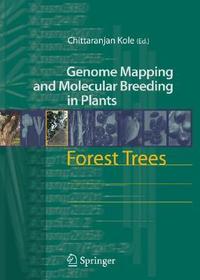
Forest Trees
Series: Genome Mapping and Molecular Breeding in Plants; 7;
- Publisher's listprice EUR 213.99
-
88 752 Ft (84 526 Ft + 5% VAT)
The price is estimated because at the time of ordering we do not know what conversion rates will apply to HUF / product currency when the book arrives. In case HUF is weaker, the price increases slightly, in case HUF is stronger, the price goes lower slightly.
- Discount 12% (cc. 10 650 Ft off)
- Discounted price 78 102 Ft (74 383 Ft + 5% VAT)
Subcribe now and take benefit of a favourable price.
Subscribe
88 752 Ft

Availability
Estimated delivery time: In stock at the publisher, but not at Prospero's office. Delivery time approx. 3-5 weeks.
Not in stock at Prospero.
Why don't you give exact delivery time?
Delivery time is estimated on our previous experiences. We give estimations only, because we order from outside Hungary, and the delivery time mainly depends on how quickly the publisher supplies the book. Faster or slower deliveries both happen, but we do our best to supply as quickly as possible.
Product details:
- Edition number 2007
- Publisher Springer Berlin Heidelberg
- Date of Publication 28 June 2007
- Number of Volumes 1 pieces, Book
- ISBN 9783540345404
- Binding Hardback
- No. of pages232 pages
- Size 276x203 mm
- Weight 1206 g
- Language English
- Illustrations XXIV, 232 p. Illustrations, black & white 10
Categories
Long description:
Genome Mapping and Molecular Breeding in Plants presents the current status of the elucidation and improvement of plant genomes of economic interest. The focus is on genetic and physical mapping, positioning, cloning, monitoring of desirable genes by molecular breeding and the most recent advances in genomics. The series comprises seven volumes: Cereals and Millets; Oilseeds; Pulses, Sugar and Tuber Crops; Fruits and Nuts; Vegetables; Technical Crops; and Forest Trees.
Forest trees cover one third of the global land surface, constitute many ecosystems and play a pivotal role in the world economy. Despite their importance in the economy, ecology and environment, genetic analysis and breeding efforts have lagged behind. Presented here are chapters on Populus trees, pines, Fagaceae trees, eucalypts, spruces, Douglas fir and black walnut, and a first-ever detailed review of Cryptomeria japonica. Innovative strategies to address the inherent problems of genome analysis of tree species are thoroughly discussed.
Forest trees cover one third of the global land surface, constitute many ecosystems and play a pivotal role in the world economy. Despite their importance in the economy, ecology and environment, genetic analysis and breeding efforts have lagged behind. This book covers Populus trees, pines, Fagaceae trees, eucalypts, spruces, Douglas fir and black walnut and offers a first-ever detailed review of Cryptomeria japonica. It discusses innovative strategies to address the inherent problems of genome analysis of tree species.
MoreTable of Contents:
Populus Trees.- Pines.- Spruce.- Eucalypts.- Fagaceae Trees.- Black Walnut.- Douglas-Fir.- Cryptomeria Japonica.
More



